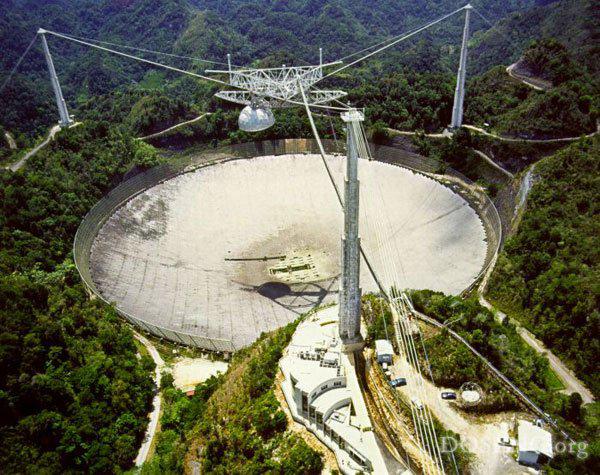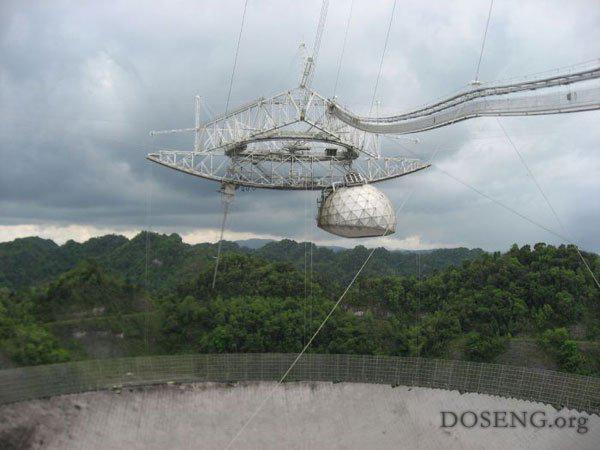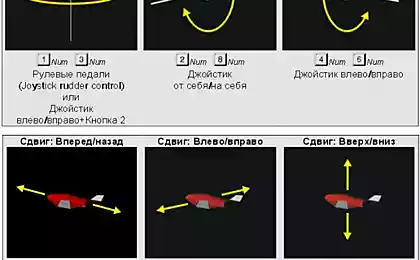981
Giant radio telescopes among the Earth (6 photos)
Radio telescopes in Arecibo - currently the largest in the world (using one of the aperture). The telescope is used for research into astronomy, physics of the atmosphere and radar observations of solar system objects.

Astronomical Observatory of Arecibo in Puerto Rico is located 15 km from Arecibo, at an altitude of 497 meters above sea level. Research conducted by Cornell University in cooperation with the National Science Foundation (USA). The Observatory is also a National Centre for Astronomy and Ionosphere US.

Design features:
Reflector telescopes located in natural sinkholes and 38 is covered with perforated aluminum plates 778 (1 to 2 m), stacked on the mesh of steel wires. An antenna feed movable, suspended by 18 cables to the three towers.
To conduct researches on radar astronomy at the Observatory there is a transmitter power of 0, 5 MW.

With this transmitter is also sent "Arecibo Message" .This is a radio signal that was sent November 16, 1974 from the Arecibo Observatory in the direction of the Hercules cluster M13 at a distance of 25,000 light years. Message lasted 169 seconds, the wavelength of 12, 6 cm. It was made in honor of the powerful radio telescope

Construction of the radio telescope was launched in 1960. The original purpose of the telescope were study the Earth's ionosphere. Author of the idea of construction: Cornell University professor William Gordon.

The official opening of the Arecibo Observatory held November 1, 1963.
Public Observatory in Arecibo is known in several Hollywood films. Giant radio telescope observatory featured, for example, in the movie "Golden Eye" from the epic James Bond and the film "Contact" is based on the novel by Carl Sagan.

Since 1999, information from this telescope arrives for processing the project SETI @ home, via computers connected to the Internet volunteers.
Currently, due to funding cuts expected closing of radar astronomy program by October 1, 2007. As a result of lack of funding may complete closure of the observatory in 2011.

Astronomical Observatory of Arecibo in Puerto Rico is located 15 km from Arecibo, at an altitude of 497 meters above sea level. Research conducted by Cornell University in cooperation with the National Science Foundation (USA). The Observatory is also a National Centre for Astronomy and Ionosphere US.

Design features:
Reflector telescopes located in natural sinkholes and 38 is covered with perforated aluminum plates 778 (1 to 2 m), stacked on the mesh of steel wires. An antenna feed movable, suspended by 18 cables to the three towers.
To conduct researches on radar astronomy at the Observatory there is a transmitter power of 0, 5 MW.

With this transmitter is also sent "Arecibo Message" .This is a radio signal that was sent November 16, 1974 from the Arecibo Observatory in the direction of the Hercules cluster M13 at a distance of 25,000 light years. Message lasted 169 seconds, the wavelength of 12, 6 cm. It was made in honor of the powerful radio telescope

Construction of the radio telescope was launched in 1960. The original purpose of the telescope were study the Earth's ionosphere. Author of the idea of construction: Cornell University professor William Gordon.

The official opening of the Arecibo Observatory held November 1, 1963.
Public Observatory in Arecibo is known in several Hollywood films. Giant radio telescope observatory featured, for example, in the movie "Golden Eye" from the epic James Bond and the film "Contact" is based on the novel by Carl Sagan.

Since 1999, information from this telescope arrives for processing the project SETI @ home, via computers connected to the Internet volunteers.
Currently, due to funding cuts expected closing of radar astronomy program by October 1, 2007. As a result of lack of funding may complete closure of the observatory in 2011.
























